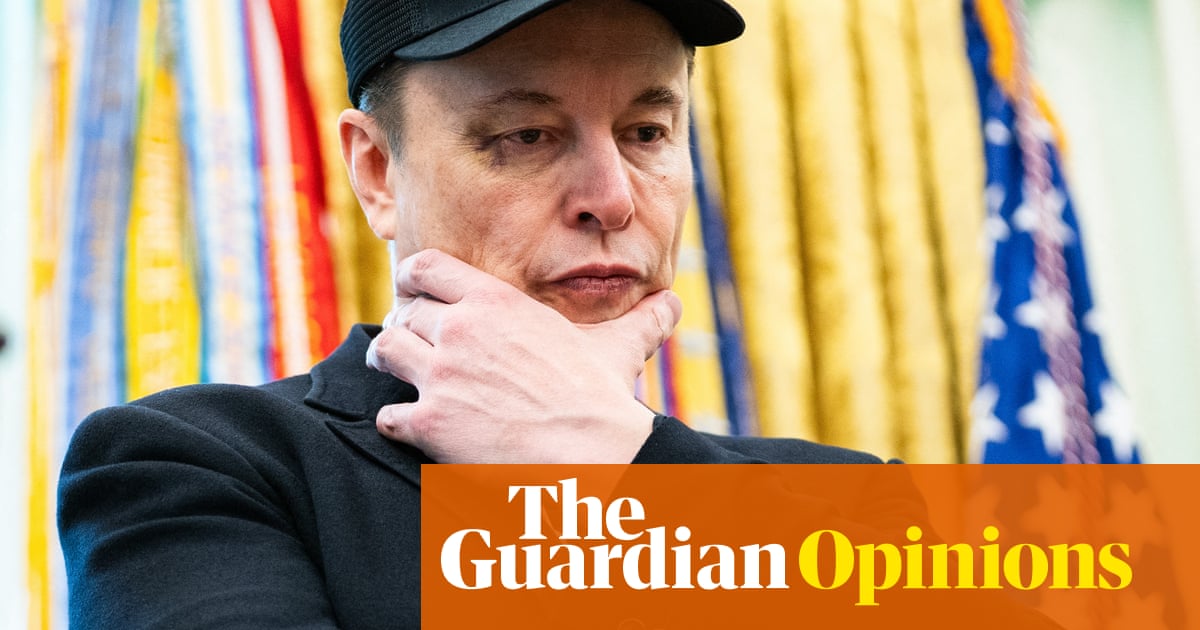Did you see Elon Muskapologise for some tweetsthis week? (Please don’t be naff and call them “X posts”.) Like me, you will be so embarrassed for Earth’s primo edgelord that he feels pressed into doing something so excruciatingly conventional. This is worse than when Kate Moss wasscapegoated into rehab.
Imagine owning the world’s premier shitposting platform – in fact, havingspent $44bn(£32bn) on it, specifically so that your magic mirror would tell you each day that you were the fairest shitposter of all – and then shuffling sheepishly on to your own pixels to mumble something about having gone “too far” with your hurty words. Buck up, sadsack – honestly.
We’ll come in a minute to how this hilariously preposterous spectacle should surely mark the absurdist endpoint of humankind’s intensely brief, intensely passionate, and intensely destructive relationship with social media. But first, a recap. Elon’s apology, of course, related to last week’sspectacular online beefthat he’d started with US president Donald Trump over the latter’s OBBB. (Sounds like a specialist Pornhub search term; actually stands for One Big Beautiful Bill.) Amusingly, the two men were not able to directly confront each other, each feeling that they could only engage on their own platforms – X in Musk’s case, Truth Social in Trump’s. Going forward, we surely need some proxy platforms these two superpowers can fight on, like the proxy war countries of the cold war. Maybe Threads and Bluesky could play the role of Vietnam and Nicaragua?
After all, I’m sure these two will do battle – covert or otherwise – once more. The path to war had been set the second they became buddies, despite the Maga crowd’s comic refusal to see the inevitable. It was only a few months ago that Fox News bobblehead Sean Hannity did afawning joint chat with the pair, telling them and his viewers: “I feel like I’m interviewing two brothers here.” Yep. Caned and unstAbel. (Completely unrelated, but in 2019,polling foundthat 13% of Americans still believe that men are “better suited emotionally for politics than most women”. Could the poll be rerun in light of new information?) And it was only a few months earlier that Musk wasexplaining to a rally crowd: “I’m not just Maga, I’m dark gothic Maga.” Mm-hm.
Anyway, in this battle, Elon ended up getting resoundingly beaten by the final boss of posting. As we know from the fact that Musk tuned up to his first day at Twittercarrying a sinkand honking “let that sink in”, this is a guy who just loves a crashingly literal joke. So it’s a shame the president was too busy playing golf to turn up at Elon’s Texas babymother compound with some latex buttocks, an elated wink to camera, and the words: “I handed him his ass!” Maybe next time.
This week was all about the apology, which should be a defining moment in man’s – and woman’s – understanding of precisely the pitfalls of being extremely online. It’s extraordinary to think that social media didn’t meaningfully exist 20 years ago, but has – in that very short span – now hurtled toward the spectacle of the world’s richest man functioning as a warning about what can happen to anyone if they spend way too much time on it. The man who literally owns X has been hoist by his own platform. Guys, no one is safe! How much more wake-up do we want our calls to be?
For a long while back there, it was fashionable to refer to the particular disorder engendered by excessive Twitter use as brainworms.Elon Muskis surely riddled with them. Intriguingly, despite essentially running the free world from the platform during his first term in office, Trump himself has remained weirdly resistant to the brainworms. If anything, his particular arrangement reminds one of that old Private Eye headline when Rupert Murdoch had some prostate bother a few decades ago: “Cancer has Murdoch”. And so with Trump and the brainworms. Brainworms have Trump. Maybe Trump IS the brainworms?
Sadly for Musk, he didn’t have the same mysteriously resistant gene. He loved Twitter so much he bought the company – for a price that was the sort of joke someone might make on Twitter – and it actually seemed to get him what he wanted for a time: a president who was buddies with him, a more-than-fair wind for all his government contracts, and every one of his posts liked by bazillions of followers who absolutely weren’t mostly bots. It might have lost money in and of itself, but seemed like a super-successful and lucrative political project when considered in the round, given his other business interests.
But this is what spending too much time on social media does to you! It makes you feel like you’re being productive, and important, and “not complicit” in whatever you’ve just farted out a couple of hundred characters on. But – and spoiler alert for anyone still unaware of the import of watching Musk deliver his equivalent of the Notes app apology meme –this is all an illusion. Spending lots of time and energy on social media platforms simply means you work for the guys who own them. For free.
Whether this week’s cautionary tale starring one of those very guys will shake humanity out of its potentially fatal attention spiral is, regrettably, doubtful in the extreme. But after watching Musk act like someone tearfully trying to de-cancel themself, no one can say the message of the spectacle was anything less than sledgehammer: delete your account, sir.
Marina Hyde is a Guardian columnist
